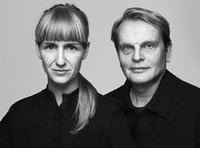The Museum side table by String Furniture offers a stylish and practical place to display flower vases, art or anything else you might want to showcase on top of it. Designed by TAF Studio, the table is height adjustable, creating endless possibilities for using the table in your home: Museum works perfectly as a bedside table, plant stand, temporary workstation or as a place to put down your coffee cup or remote controls when lounging on the sofa. The table leg, inspired by industrial steel beams, is placed on the side of the base so that the table top can easily be slid over the sofa or bed.
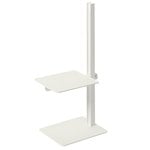
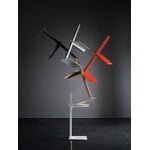

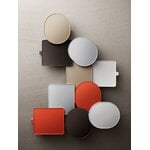
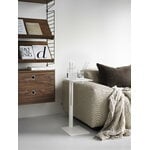
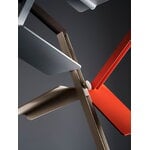
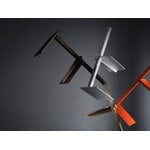
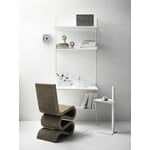
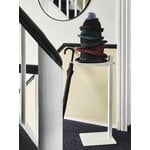
Museum side table, white
String Furniture
Description
The Museum side table by String Furniture offers a stylish and practical place to display flower vases, art or anything else you might want to showcase on top of it. Designed by TAF Studio, the table is height adjustable, creating endless possibilities for using the table in your home: Museum works perfectly as a bedside table, plant stand, temporary workstation or as a place to put down your coffee cup or remote controls when lounging on the sofa. The table leg, inspired by industrial steel beams, is placed on the side of the base so that the table top can easily be slid over the sofa or bed.
Product details (8)
- Colour
- White
- Width
- 24 cm
- Depth
- 30 cm
- Height
- 76 cm
- Adjustable height
- Yes: adjustable shelf, height: 32-73 cm
- Material
- Powder coated aluminum (shelf and profile)
- Frame material
- Powder coated steel
- Notes
- Comes flat-packed.
- Product ID
Designer
The Swedish architects Gabriella Lenke and Mattias Ståhlbom have run the architecture and design studio TAF (previously TAF Architects) in Stockholm, Sweden, since 2002. TAF Studio’s aim is to make ordinary life less ordinary through subtle but effective changes in how products and architecture appear and function. A recurrent departure point in TAF Studio’s projects is that everyday objects by their very commonness can be made uncommon.
View all productsReviews (1)
5
Based on 1 reviews
-
W
Whitney D
Scarborough, Canada
Easy to put together, high quality, simple design. Highly recommend!
266 days ago
Sustainability
The Product Sustainability Framework, our criteria of sustainable design, helps you find the most sustainable products in our selection. Read below which sustainability criteria this product has met.
Working conditions & labour 7/9
-
Equal opportunities for all employees
-
Commitment to UN Global Compact, fair compensation for all employees
-
Corporate responsibility requirements defined and communicated for suppliers
-
Transparent supply chain
-
Suppliers' compliance to a code of conduct ensured
-
Compliance to the UN Guiding Principles on Business and Human Rights ensured in the supply chain
-
Support for community involvement in the supply chain
-
Systematic work for improved inclusion and well-being in the workplace
-
Direct suppliers audited and certified
Eco-friendly production 6/9
-
Fair and resource-wise water-use in production
-
No incineration or landfilling of returned items
-
No use of endangered species as materials
-
No direct environmental emissions or waste (excl. GHGs) from production
-
Material-efficient and ecological packaging
-
No potentially harmful chemicals used in own production
-
The sustainability of direct suppliers' production is addressed and monitored
-
Production and material sourcing that respect biodiversity, animal rights, and natural ecosystems
-
Positive impact on nature’s well-being through operations that regenerate natural ecosystems
Climate impact 3/8
-
Company's direct greenhouse gas emissions identified and commitment to reduction
-
Product's carbon impact identified and commitment to reduction
-
Guidance on energy- and eco-efficient use of the product
-
Contribution to climate initiatives beyond the brand’s direct operations
-
Low-carbon or compensated transportation
-
Carbon footprint of the product calculated and goals set to reduce it
-
100 % renewable energy in own production and operations
-
Carbon neutral or carbon negative product
Sustainable materials 3/6
-
Sustainable and long-lasting material choices
-
No harmful or hazardous substances
-
Responsible raw material sourcing and production
-
Materials suited for circularity: monomaterials, recyclable finishings, renewable or recycled contents etc.
-
Ecological materials: natural, biodegradable, recyclable or recycled contents
-
Outstanding materials in terms of innovativeness, responsibility, sustainability and circularity: local production or sourcing, 100 % recycled content, C2C-certification etc.
Circular design 4/5
-
High aesthetic quality promoting long-term use of the product
-
Technically durable product design and material choices
-
Design for enduring life-long quality
-
Design and support for product maintenance, repair and upgradability
-
Innovative circular design solutions: circular service system, resale platform, remanufacturing, collection of used products, etc.








